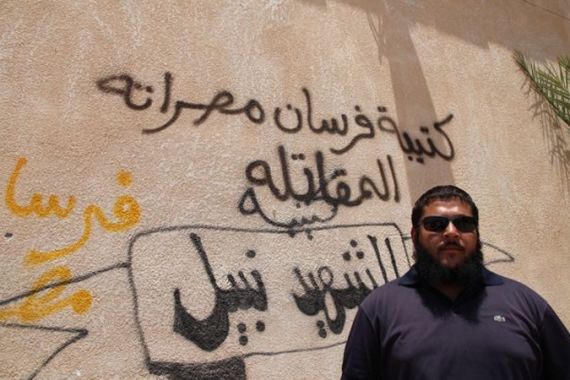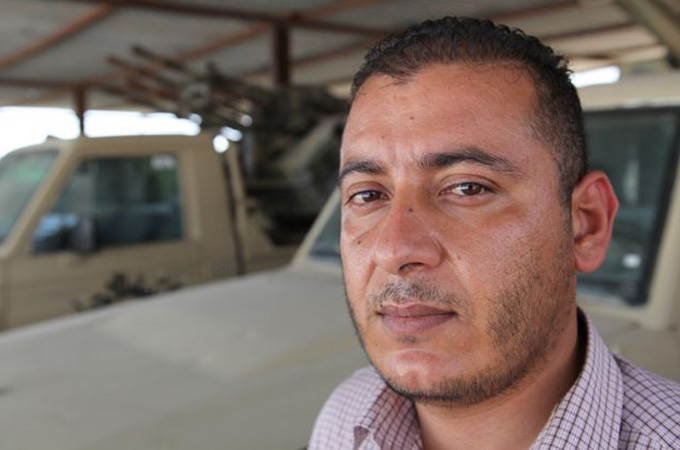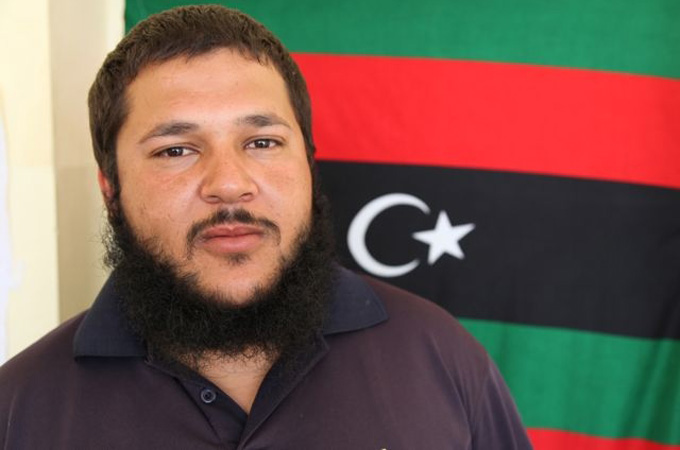The ‘Military Knights’ of Misrata
Two days before Libya goes to the polls, Al Jazeera asks former NTC fighters if their sacrifices have been worth it.

Shortly after the first shots of the Libyan revolution were fired in February last year in Benghazi, a group of young men gathered in an abandoned warehouse in the country’s third city, Misrata.
Defecting officials from Muammar Gaddafi’s regime in Tripoli secretly exhorted them to take up arms, with the promise of weapons if they managed to amass manpower to start a revolt similar to that in Benghazi.
Many of the men knew each other from working in the city’s iron and construction industry, but the bonds between them had yet to be established.
The group consisted of only 30 recruits, most of whom had never held a gun in their lives, but over the course of the revolution they would grow to become a formidable fighting unit of about 300 soldiers.
They called themselves the Military Knights of Misrata, and were involved in some of the fiercest battles in the final stages of the revolution.
Joining defecting soldiers and other fighting groups from Misrata, they freed their hometown and marched on to Tripoli where they were involved in battle at Gaddafi’s Bab Azizia military complex.
After the fall of the capital, they went to Sirte for the final battle of Libya’s uprising.
Six of the Military Knights were killed in the fighting, and many more were injured.
With Libya’s July 7 national elections just days away, Al Jazeera’s David Poort caught up with the now ex-fighters in Misrata to ask them whether their sacrifices were worth it.
|
Hamza Ali Ashatloui, 23 |
David Poort: How did the revolution affect your life?
 |
| Hamza Ali Ashatloui, 23 [David Poort/Al Jazeera] |
HAA: Before the uprising started I had a good job at a factory that produced construction cranes, but the company went bankrupt because it had to close for a long time because of the fighting.
During a big battle on Airport Road here in Misrata, I was shot in the groin and was also wounded in my stomach.
Now, I’m a volunteer at an organisation that builds schools and in my free time I help out guarding the local weapon depot.
DP: So the revolution has destroyed your livelihood…
HAA: I don’t look at it that way. We need to be patient now that Libya is free, thank God. Even before the revolution, if you worked as a small employee for the government, there would be times that you wouldn’t get your salary for three months. Now, if you work for the government in whatever capacity, you will get your salary every month, on time. So, we must be patient.
DP: Whom will you vote for on July 7?
I don’t know the names of the candidates yet, but it will be someone who loves Libya and can hold the country together, who can create peace between all regions, including the south. It needs to be someone who can help young men getting back to work, so that they can get married. But first, peace in the country is the most important thing.
|
Ali Hussein Tayeb, 27 |
DP: Are you going to vote on Saturday?
 |
| Hamza Ali Ashatloui, 23 [David Poort/Al Jazeera] |
AHT: For sure! For me, it is a magnificent feeling that for the first time I can vote.
Elections used to be something we only knew from TV and I never thought this would be possible in Libya. I still need more information on whom I will be voting for and I will probably decide on the final day.
DP: What did you do before and during the revolution?
AHT: I was a hotel administrative worker in Misrata when the revolution started, and was asked by my friends who joined the Military Knights before me to act-up as an ambulance driver at the front, first in Misrata, then in Tripoli and later in Sirte.
I’ve seen many horrible things: friends who got wounded, friends who died. It stays with you but also makes you more determined to benefit from this for our future.
Some of us returned to their old jobs, others have joined the army, but we are all very proud to have been part of this group. We still get together at a local arms depot once or twice a week.
|
Omar Abdulsalam Sharqasi, 26 |
DP: Was your sacrifice worth it?
 |
| Omar Abdulsalam Sharqasi, 26 [David Poort/[Al Jazeera] |
OAS: Although I lost two close friends and many others were injured, this was war and with war comes sacrifice. These democratic elections are what we’ve been fighting for. It’s not as if we were in it for the money [laughing]. I’m very happy that we now can be involved in building our own future through politics.
Personally, the war has changed me. One of my friends died here in Misrata and the other one died not so long ago, five months after getting wounded in Sirte. We grew up together and because of his death I changed my behaviour in life.
DP: There are still Gaddafi loyalists who would want to disrupt these elections. What would you say to them?
OAS: All of Libya should be one family; we are all friends and brothers but unfortunately some of my friends are still fighting in the south.
They will be back before Saturday and then we will sit together and decided whom we’re supporting in the elections. We should all vote for the same person or group so they’ll stand a better change of being elected. One thing is clear: whoever we choose, this person or party must never have served Gaddafi.
| Faisal Ahmed Abughursa, 31 |
DP: You joined the army after the revolution. What did you do before the uprising?
 |
| Faisal Ahmed Abughursa, 31 [David Poort/[Al Jazeera] |
FAA: Before the revolution I was working in an iron and construction company, but I joined the anti-Gaddafi forces early on in the uprising. I was positioned defending the eastern gate [in] the city and when that battle was won I fought in Tripoli and later in Sirte.
DP: Is the army ready for Election Day?
FAA: I think we should not fool ourselves and think it will be a quiet day. There will be big crowds in the streets but we have been training for this and we are ready. Many former revolutionaries have remained in the army and will know how to deal with it.
The transition from revolutionary to regular soldier went smoothly for me but now with the new elections we have two demands.
First; we want a good salary that allows for a normal life. And second; we don’t want to open the free Libya army up for recruits who used to fight for Gaddafi. Government soldiers who stayed home (or neutral) during the revolution should also not be allowed into the free Libyan army.